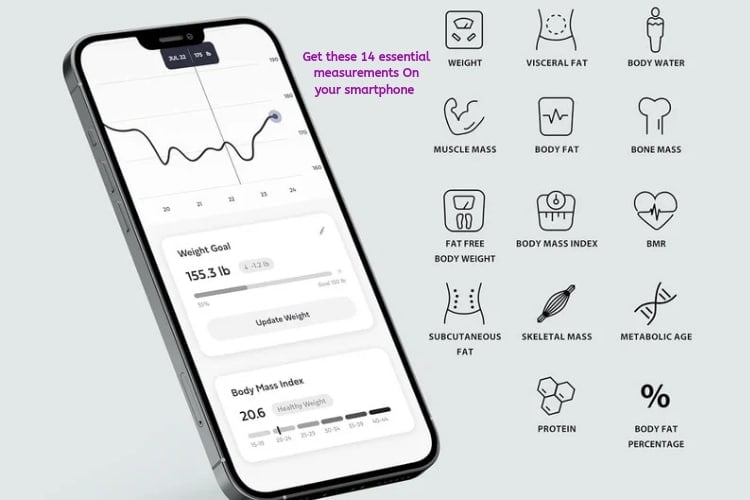Using Smart Scales: Manage Metabolic Age, Skeletal Mass, Muscle Mass, Body Fat, and Beyond
Step into the world of smart scales and unlock a wealth of insight into your body’s composition, health, and overall well-being. Embrace the possibilities they offer and embark on a journey of self-discovery, health, and well-being.

In my last article, I had discussed various ways to measure Body Fat, using different machines. One of them was Smart Scales, which we are going to learn about in detail in this article as well as ways to operate them.
In this comprehensive guide, we delve into the power of these state-of-the-art devices, revealing how they can help you manage crucial metrics such as metabolic age, skeletal mass, muscle mass, body fat, and more.
How do Smart Scales help you?
Gone are the days of relying on weight alone as a measure of health and fitness. Smart scales go beyond the numbers on a traditional scale, providing a detailed analysis of your body composition.
By utilizing advanced technology and algorithms, these scales offer an in-depth understanding of your body’s unique makeup, empowering you to make informed decisions and take control of your health journey.
Curious about your metabolic age? Smart scales have got you covered, giving you valuable insights into how efficiently your body burns calories. Interested in tracking your muscle mass and skeletal mass? These devices provide accurate measurements, helping you monitor changes and set realistic goals. Concerned about your body fat percentage? Let a smart scale be your guide on the path to achieving a healthier body composition.
Unleash the power of smart scales and gain a deeper understanding of your body. Transform the way you approach health and fitness with the help of these cutting-edge devices that offer more than just weight measurements.
Understanding Metabolic Age and Its Significance
Metabolic age refers to the age at which your body’s metabolism is functioning. It is a measure of how efficiently your body burns calories and can provide valuable insights into your overall health and fitness level.
While chronological age simply indicates the number of years you have lived, metabolic age takes into account factors such as muscle mass, body fat percentage, and activity level to determine how well your body is functioning.
Smart scales can calculate your metabolic age by analyzing various parameters, including weight, body composition, and activity level. By tracking your metabolic age over time, you can assess the effectiveness of your lifestyle choices and make adjustments as needed.
For example, if your metabolic age is higher than your chronological age, it may indicate that your body is not efficiently burning calories, and you may need to focus on increasing your muscle mass and improving your overall fitness.
Managing your metabolic age is crucial for maintaining a healthy weight and promoting optimal health. By using a smart scale to track your metabolic age, you can make informed decisions about your diet, exercise routine, and overall lifestyle choices.
Whether you want to lose weight, build muscle, or improve your overall well-being, understanding and managing your metabolic age can be a valuable tool on your health journey.
Related article-
Managing Skeletal Mass with Smart Scales
Skeletal mass, also known as bone mass, refers to the weight of your bones. It is an important component of body composition and plays a crucial role in overall health and well-being. Maintaining healthy skeletal mass is essential for proper posture, mobility, and bone strength.
Smart scales can provide accurate measurements of skeletal mass, allowing you to track changes and monitor your bone health.
By regularly monitoring your skeletal mass, you can identify any potential issues such as osteoporosis or bone loss and take appropriate steps to address them.
Additionally, tracking your skeletal mass can help you assess the effectiveness of your exercise routine and make adjustments if necessary to promote bone health.
To manage your skeletal mass effectively, it is important to incorporate weight-bearing exercises into your fitness routine. Activities such as weightlifting, jogging, or dancing can help stimulate bone growth and maintain healthy skeletal mass.
By combining regular exercise with the insights provided by a smart scale, you can take control of your bone health and promote overall well-being.
The Importance of Tracking Muscle Mass
Muscle mass plays a vital role in several aspects of health and fitness. It not only contributes to overall strength and physical performance but also helps to boost metabolism, burn calories, and maintain a healthy body composition.
Tracking your muscle mass can provide valuable insights into your fitness level and help you set realistic goals for muscle growth and overall well-being.
Smart scales utilize bioelectrical impedance analysis (BIA) technology to measure muscle mass accurately. BIA works by sending a low-level electrical current through the body, which passes more easily through muscle tissue than fat tissue. By analyzing the resistance to the electrical current, smart scales can estimate your muscle mass and provide valuable information about your body composition.
Regularly monitoring your muscle mass can help you track changes over time and adjust your fitness routine accordingly. If you are looking to increase muscle mass, incorporating strength training exercises into your workout regimen can be beneficial.
By combining the insights provided by a smart scale with a well-rounded exercise program, you can effectively manage and track your muscle mass on your health and fitness journey.
Measuring Body Fat with Smart Scales
Body fat percentage is a crucial metric to consider when assessing overall health and well-being. Excess body fat can increase the risk of various health conditions, including heart disease, diabetes, and certain types of cancer.
Measuring body fat percentage accurately can help you determine whether you need to make changes to your diet, exercise routine, or overall lifestyle to achieve a healthier body composition.
Smart scales use BIA technology to estimate body fat percentage. By analyzing the resistance to the electrical current as it passes through the body, these scales can differentiate between fat tissue and lean tissue. This provides you with a reliable measurement of your body fat percentage, allowing you to track changes over time and make informed decisions about your health and fitness goals.
Monitoring your body fat percentage can be particularly useful if you are trying to lose weight or improve your overall body composition.
By regularly tracking this metric, you can ensure that you are losing fat and not muscle mass, which is crucial for maintaining a healthy metabolism and overall well-being.
With the insights provided by a smart scale, you can make informed decisions and adjust your approach accordingly to achieve your desired body composition.
Other Key Metrics Provided by Smart Scales
Beyond metabolic age, skeletal mass, muscle mass, and body fat percentage, smart scales offer a range of additional metrics to help you gain a comprehensive understanding of your body’s composition and overall health. These metrics can include:
Body Mass Index (BMI):
BMI is a commonly used indicator of overall health based on a person’s weight and height. While it is not a perfect measure, it can provide a general guideline for assessing weight-related health risks.
Water Percentage:
Proper hydration is essential for overall health and well-being. Smart scales can estimate your body’s water percentage, helping you track your hydration levels and make necessary adjustments to your fluid intake.
Visceral Fat:
Visceral fat refers to the fat that surrounds your internal organs. Excess visceral fat is associated with an increased risk of heart disease, diabetes, and other health conditions. Smart scales can estimate your visceral fat level, allowing you to monitor changes and take steps to reduce it if necessary.
Basal Metabolic Rate (BMR):
BMR is the number of calories your body needs to perform basic functions at rest. Understanding your BMR can help you create a more accurate calorie deficit or surplus for weight management.
Muscle Quality:
Smart scales can also provide insights into the quality of your muscle tissue. This metric takes into account factors such as muscle strength, density, and overall condition, helping you assess the effectiveness of your exercise routine and track improvements over time.
Here is a table about smart scale metrics like total body fat, total body water, visceral fats, basal metabolic rate, muscle mass, skeletal mass with reference range for each in a healthy male and female person.
| Metric | Reference Range Male | Reference Range Female |
|---|---|---|
| Total Body Fat | 10-20% | 18-28% |
| Total Body Water | 50-65% | 45-60% |
| Visceral Fat | < 12 | < 12 |
| Basal Metabolic Rate | 1600-1800 kcal/day | 1400-1600 kcal/day |
| Muscle Mass | 40-50% | 30-40% |
| Skeletal Mass | 25-30% | 20-25% |
By utilizing smart scales that offer these additional metrics, you can gain a more comprehensive picture of your body’s composition and make more informed decisions about your health and fitness goals.
How to Choose the Right Smart Scale for Your Needs
With numerous smart scales available on the market, choosing the right one for your needs can seem overwhelming. However, considering a few key factors can help you make an informed decision:
Accuracy:
Look for a smart scale that utilizes advanced technology, such as BIA, to provide accurate measurements. Reading reviews and checking for certifications can help ensure the scale’s accuracy.
Compatibility:
Check if the smart scale is compatible with your smartphone or fitness tracking app. Integration with these devices can make it easier to track and analyze your data.
Connectivity:
Consider whether you prefer a smart scale that connects via Bluetooth or Wi-Fi. Bluetooth scales typically require your smartphone to be nearby, while Wi-Fi scales can sync data automatically to your preferred app or cloud storage.
User-Friendly Interface:
Look for a smart scale with an intuitive interface and easy-to-read display. Some scales also offer additional features such as a backlit screen or voice guidance.
Design and Build Quality:
Consider the overall design and build quality of the smart scale. Look for a scale that is durable and can withstand regular use. Additionally, consider the size and weight of the scale, especially if you have limited storage space.
Here is a table showing popular smart scales and their prices:
| Smart Scale Name | Cost of Purchase |
|---|---|
| Fitbit Aria 2 | $39 |
| Withings Body+ | $199.00 |
| FitIndex Smart Scale | $35.99 |
| Eufy Smart Scale C1 | $79.99 |
| Nokia Body Cardio | $179.95 |
| Renpho Bluetooth Body Fat Scale | $30.49 |
| Yunmai Premium Smart Scale | $69.99 |
| Greater Goods Digital Body Weight Scale | $29.99 |
| GE Smart Scale | CAD 66.99 |
| Meditative Bluetooth Smart Scale | Rs. 1199.00 |
By considering these factors and weighing them against your specific needs and preferences, you can choose a smart scale that best suits your requirements.
Disclosure
This articles contains affiliate links to Amazon.com. By clicking this link and making a purchase using the link, the author gets a small commision which helps maintain this website, with no extra cost to the purchaser.
Tips for Accurate and Consistent Measurements
To ensure accurate and consistent measurements with your smart scale, consider the following tips:
- Place the scale on a hard, flat surface: Avoid placing the scale on carpet or uneven surfaces, as this can affect the accuracy of the measurements.
- Use the scale at the same time each day: To obtain consistent measurements, try to weigh yourself at the same time each day, preferably in the morning before eating or drinking.
- Stand still and centered on the scale: Distribute your weight evenly on both feet and stand in the center of the scale. Avoid leaning or shifting your weight, as this can affect the accuracy of the measurements.
- Ensure bare feet: For accurate measurements, stand on the scale with bare feet. Wearing socks or shoes can interfere with the electrical current used to estimate body composition.
- Stay hydrated: Ensure you are adequately hydrated before stepping on the scale, as it can affect the accuracy of certain measurements such as body fat percentage.
Following these tips can help you obtain more accurate and consistent measurements with your smart scale, allowing you to track changes and progress more effectively.
Integrating Smart Scales into Your Fitness Routine with Your Smartphone
Smart scales offer the convenience of seamlessly integrating with your smartphone or fitness tracking app, allowing you to effortlessly track, analyze, and monitor your body composition data. Here are some ways you can make the most of this integration:
Sync your data:
Ensure that your smart scale is connected to your smartphone or fitness tracking app via Bluetooth or Wi-Fi to sync your data automatically. This eliminates the need for manual data entry and provides a more accurate and up-to-date record of your progress.

Set goals and track progress:
Utilize the goal-setting features of your smartphone or app to set targets for metrics such as body fat percentage or muscle mass. Regularly track your progress and adjust your routine as needed to achieve your desired goals.
Analyze trends and patterns:

Use the data provided by your smart scale to identify trends and patterns in your body composition. Look for correlations between your lifestyle choices, such as diet or exercise, and changes in your metrics. This can help you make more informed decisions and optimize your health and fitness routine.
Share your progress:
Some smartphones or fitness tracking apps allow you to share your progress with friends, family, or even your healthcare provider. Sharing your journey can provide support and accountability, as well as valuable insights from others who may have similar goals or experiences.
By leveraging the integration between smart scales and smartphones, you can streamline your health and fitness routine, track your progress more effectively, and make data-driven decisions for optimal results.
Suggested Reading: How to use Smart Scales
Conclusion: The Future of Smart Scales and Their Impact on Health and Wellness
Smart scales have revolutionized the way we approach health and fitness. No longer are we limited to tracking weight alone as a measure of progress. These cutting-edge devices provide a comprehensive analysis of our body composition, offering valuable insights into metrics such as metabolic age, skeletal mass, muscle mass, and body fat percentage.
By utilizing smart scales, we can gain a deeper understanding of our bodies and make informed decisions about our health and fitness goals. Whether we are looking to lose weight, build muscle, or improve our overall well-being, smart scales empower us to take control of our health journey and make positive changes.
The future of smart scales looks promising, with advancements in technology continually improving their accuracy, usability, and integration with other health and fitness devices.
As these devices become more accessible and affordable, they have the potential to positively impact the health and wellness of individuals worldwide.
With the insights provided by these state-of-the-art devices, you have the tools to transform your approach to health and fitness, setting yourself up for long-term success.
Some of my previous articles on similar topics:
Final Words
I hope this article on Smart Scales and its uses encourages and helps you to take a look at your health with a new perspective. When you know where your health stands at your age, you can take informed decision to improve it- and this instrument will definitely help you achieve it.
If you have found this article useful, do consider sharing it by using the social media icons below or simply click to tweet here-
Unveiling the Power of Smart Scales: A Comprehensive Guide Share on XMy next topic for discussion will be – 5 expert tips on how to reduce Belly Fats and improve Muscle Mass.
Adios.

